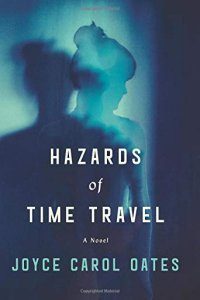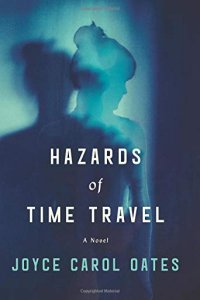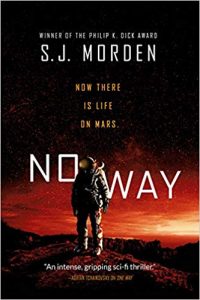Paul Di Filippo Reviews Hazards of Time Travel by Joyce Carol Oates
 Hazards of Time Travel, Joyce Carol Oates (Ecco 978-0-06-231959-3, $26.99, 336pp, hardcover, November 2018)
Hazards of Time Travel, Joyce Carol Oates (Ecco 978-0-06-231959-3, $26.99, 336pp, hardcover, November 2018)
Joyce Carol Oates turned eighty this year, and her fabled productivity seems undiminished. Given that she began her career at age nineteen by winning a short story contest sponsored by Mademoiselle, she has passed sixty years of unceasing and exemplary creativity. Moreover, she continues to delve into areas outside her familiar remits of mimetic fiction, crime fiction, and horror fiction. Her newest novel is a case in point, being hardcore science fiction, not a territory she has made many tracks in. (Although since I do not have a hundred-percent grasp of her huge oeuvre, I expect to hear from someone contradicting me by citing a dozen such times she’s been here before!) It starts out as a dystopia, then segues into “dystopia plus something else.” And the transition occurs only some 44 pages into the plot, rendering the focus more on the “something else” than the dystopia.
We start in the year 2039, and that extremely close date—just twenty years ahead—is going to influence how realistic you believe her scenario to be. Just keep in mind the comparison between, say, 1998 and 2018 as a standard of measurement. Although of course “black swan” events can happen, and trends can accelerate.
The USA is no more, having amalgamated with Canada and Mexico to become the RNAS: Reconstituted North American States. The dictatorship that currently rules has all the standard Orwellian features: no free press, no dissent, no academic or cultural freedom. It controls all modes of communication, and enforces its edicts by two methods: death (Vaporization) or Exile. Vaporization also brings with it a trip down the memory hole, as all traces of the individual are extirpated, and one may never make reference to the victim again. Perpetual warfare exists. “So many wars! They were fought now at long-distance, and did not involve living soldiers, for the most part; robot-missiles were employed, and powerful bombs said to be nuclear, chemical, and biological.”
Oates adds some novel features to her hellish future: all people are graded by skin tones with commensurate socio-statuses: ST1 – ST10, with the first grade being Caucasian. And the government’s double-think phrases and acronyms abound in insane, almost Lem-style profusion. “Questioner of Authority.” “HSPSO (Home Security Public Safety Oversight).” “Teletransported.” This debasement of language adds effectively to the nightmare quotient.
Our viewpoint character is Adriane Strohl, seventeen years old and upon the verge of graduating high school as valedictorian. Adriane is no rebel—in fact, she wants honestly to be a good citizen, even with a few doubts—but is just too bright and curious for her own welfare. Her commencement speech is deemed traitorous before she can even deliver it, and she is remanded to Exile.
Now here’s where the disjunction occurs. For Exile means a time-travel journey to the past, under strict conditions, where the prisoner is expected to contemplate their sins and to reform, while living covertly amongst the natives. (Cue Silverberg’s Hawksbill Station.) Returned Exiles may resume their place in 2039 society. (How the reform program is to be enforced—aside from a few snoops supposedly also planted back in the past—and why this vacation in the relatively idyllic older eras would not be seen as a gift, Oates never really explains.)
So Adriane is sent back to the year 1959—dubbed Zone 9 in NewSpeak—to assume her guise as a freshman at Wainscotia University. There, amidst much mental and physical travails, she will find that her studies of the then-prevalent discipline of Skinnerism will start to inform her view of 2039. But more significantly, she will fall in love with one of her instructors, Ira Wolfman, who—slight spoiler here—will prove to be an Exile as well. And in a feedback loop of rebellion, they will eventually challenge their RNAS-imposed fate.
Oates’s bipartite format for the book—with significant but not overwhelming leakage of matters from the first smaller portion into the latter larger portion—requires a dual appraisal.
The dystopia itself is pretty standard, with the exceptional aspects I cited above. The backstory does not really chart how we got there, or how any dystopia a writer might envision after seventy years of post-Orwell events would and must differ from 1984. If you take a book like Cory Doctorow’s Walkaway or Lidia Yuknavitch’s The Book of Joan as hip postmodern dystopias, then Oates’s version seems relatively flat. Although she does get a good dig in at current politics:
Presidents of the Reconstituted North American States were heads of the Patriot Party. The general population knew little about them though they were believed to be multi-billionaires, or the associates of multi-billionaires. Their names were often invented names, fictitious names, attached to individuals or animated human figures replicated endlessly online and on TV; you were conditioned to “like” them by their friendly, smiling facial expressions and by ingeniously addictive musical jingles that accompanied them, as you were urged to “dislike” other figures. To attempt to learn facts about them was in violation of Homeland Security Information and could be considered treasonous.
So on this level, the book offers nothing radically new.
However, the bulk of the text is devoted to Adriane’s masquerade in 1959, where Oates effectively conjures up some of the same weirdness exhibited in Connie Willis’s time travel novels, the sense of an imposter always in danger. There’s even a resonance with the supremely deranged ambiance of Michel Faber’s Under the Skin, where alien Isserley is always ill at ease among human cattle. Compare also to the time-travel subterfuges in Tom Sweterlitsch’s The Gone World. At one point Oates even offers a seminal PKD-style explanation as the foundational truth of the Exile process. But I think she eventually wants us to discard that interpretation. (I’ll offer another oddball analysis in a minute.)
What we also get is of course the archetypical narrative of a young woman’s maturation, for the love story between Adriane and Wolfman is given much heft. The 1959 ambiance is colorfully evoked, and, although this touchstone occurs a decade later, we end up with a kind of Georgy Girl vibe. This is signature Oates territory, ever since “Where Are You Going, Where Have You Been?” and she carries it off with her usual insights and aplomb. Adriane emerges as a vast churning cauldron of raw potential and confusion that needs to be distilled and refined. And she does achieve some measure of that maturation by book’s end.
I am not quite sure what to make of this particular mythic angle I saw. Adriane goes to live in a campus dorm called “Acrady.” Now, this is so obviously an anagram of “Arcady” that I looked at Adriane’s name and instantly saw “Ariadne,” which would make her full name “Adriane’s stroll,” i.e., a walk through the maze. Thus Ira Wolfman would be the Minotaur? But if so, what is the labyrinth they inhabit?
Might the labyrinth be mental illness?
Adriane is portrayed as very mentally unstable—a natural condition if she were indeed under the stress of Exile, in a strange land. But I don’t think it’s too farfetched to see her as a native of 1959 who is cracking up under the pressures of starting college life, and manufacturing this whole fantasia as compensation. Wolfman would be in a folie a deux with her. This would explain some of the sparsity of details and unlikelihoods for her invented 2039, and also divergences between what she sees sometimes and what Wolfman sees.
It’s an interesting speculation, but probably should not be the definitive one. Instead, let us savor Oates’s depiction of a future so rotten, it even infects the past.
 While you are here, please take a moment to support Locus with a one-time or recurring donation. We rely on reader donations to keep the magazine and site going, and would like to keep the site paywall free, but WE NEED YOUR FINANCIAL SUPPORT to continue quality coverage of the science fiction and fantasy field.
While you are here, please take a moment to support Locus with a one-time or recurring donation. We rely on reader donations to keep the magazine and site going, and would like to keep the site paywall free, but WE NEED YOUR FINANCIAL SUPPORT to continue quality coverage of the science fiction and fantasy field.







